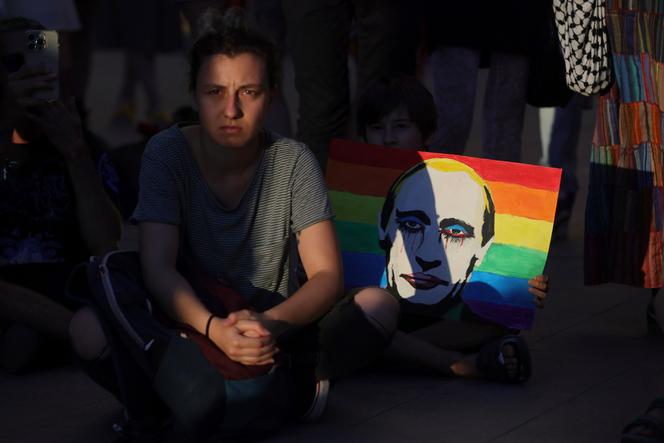


On Wednesday, August 7, Bulgarian parliamentarians passed a law banning "LGBTQ+ propaganda and promotion" in schools, provoking growing indignation in the country. Since Thursday, August 8, demonstrators have been denouncing this attack on sexual minorities. Hundreds of people gathered outside the gates of Sofia's Parliament on Thursday to express their outrage, waving multicolored flags and chanting slogans hostile to the law.
Introduced on the proposal of the pro-Russian far-right party Vazrazhdane ("Renaissance"), a legislative amendment was adopted by a large majority, with 159 votes (22 against and 13 abstentions). It now makes it illegal to "encourage" a "non-traditional sexual orientation" and a gender identity "other than biological." The rapporteurs justified the need for swift legislation on this issue by pointing to the "unacceptable normalization of non-traditional sexual orientation" through propaganda aimed at Bulgarian schoolchildren. Denitsa Lubenova, a lawyer for the LGBTQ+ association Deystvie ("Action"), said the MPs took advantage of the current context of cultural warfare around the Olympic Games to push through this reform.
In the throes of serious political instability, Bulgaria will be calling its voters to the polls this autumn for the seventh time since 2021. This lightning passage of a particularly controversial law is seen by its detractors as an electoral propaganda tool, a political maneuver that could well benefit the far right in the legislative elections. In Bulgaria, where public opinion is largely hostile to the LGBTQ+ community, neither marriage nor civil unions between people of the same sex are permitted. In 2023, according to ILGA-Europe, which brings together LGBTQT+ associations across the Old Continent, along with Romania and Poland, the country was already one of the worst performers in the European Union in terms of sexual minority rights.
This anti-LGBTQ+ offensive is strongly reminiscent of the Hungarian law enacted in the summer of 2021 as part of a plan to combat pedophilia, banning discussions of homosexuality in the presence of minors under threat of a fine. In supporting it, Orban was inspired by the legislation used in Vladimir Putin's Russia to repress sexual minorities. Judging that Hungary had infringed the rules of the single market and the fundamental rights of the European Union, the European Commission launched infringement proceedings against Budapest. The case ended up before the Court of Justice of the European Union, which could deliver its verdict in June 2025. Fifteen member states, including France and Germany, as well as the European Parliament, joined this legal action, a sign of the unprecedented indignation provoked by this Hungarian legislation.
You have 39.48% of this article left to read. The rest is for subscribers only.
